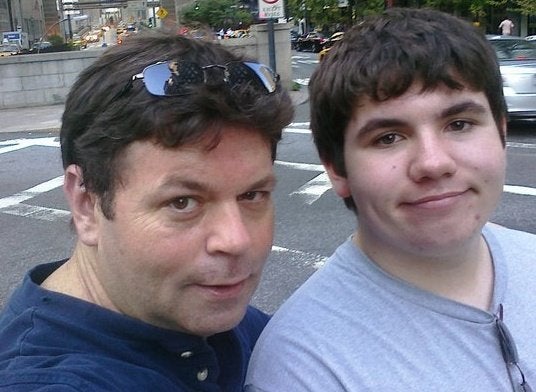Letter: Grieving parents deserve time away from work

Martin Connors (left), with his son, Timothy, who died in 2011. (Photo courtesy of Martin Connors)
Currently, there are two bills in the U.S. House and Senate that would expand the Family Medical Leave Act to include the death of a child as a covered condition. Right now, if your child dies, most companies grant only three to five days bereavement leave. I know we can do better.
Father’s Day is quickly approaching, and I must say I am not looking forward to it. It’s because I am a grieving dad. Just writing those horrific words causes me to pause and think about how difficult this journey has been and will continue to be for some time.
My son Timothy died in 2011, and have spent the past two trying to survive this loss. As much as a try, I cannot make sense of my his death.
You see, most people think that bereaved parents should pick themselves up, dust themselves off and get things back to “normal.” When I say “most people,” I mean people who have not buried a child. Those of us unfortunate enough to have to live this reality know it isn’t quite that simple. I and the thousands of other grieving parents will never get back to “normal.” Although we try, that never seems to happen after the death of a child. How can it? The death of a child goes beyond most people’s comprehension, except for the bereaved parents who have to walk this path. We don’t have the luxury of removing that thought from our heads. We live it. Every day, we live it.
To help other bereaved parents who will follow in my footsteps, I have joined fellow grieving dads Kelly Farley and Barry Kluger to assist them in bringing awareness to the Farley-Kluger Initiative. Over 61,000 petitions have already been sent to Washington, D.C.; many of these petitions have been signed by residents of Pennsylvania.
Currently, there are two federal bills (The Parental Bereavement Act of 2013) sitting in the House of Representatives (HR515) and the Senate (S226) that propose expanding the Family Medical Leave Act of 1993 to include the death of a child as a covered condition. Right now, you receive up to 12 weeks unpaid leave if you have a child, adopt a child, care for a sick family member, you are ill or you are caring for an injured service member. If your child dies, most companies grant three to five days bereavement leave.
Sadly, there is no political support from Pennsylvania representatives or senators in Washington on this issue. As Pennsylvanians, I know we can do better. I know compassion isn’t a thing of the past. This issue shouldn’t be caught up in Washington politics. It’s a common-sense change, because no parent is sheltered from the death of a child, and those affected are Democrats, Republicans, rich, poor, and from all cultural and religious backgrounds.
I think we can all agree that no one wants more government in their lives, but we want the businesses that rely on those who have lost a child to recognize that the best assets of a company walk out the door at the end of the workday. They are what makes the economy move along. They have given their employers loyalty, dedication and productivity, but in the eyes of some companies, the death of a child makes them “expendable” if they are unable to return to work the day after burying their child.
I cannot begin to imagine why anyone would not want to extend a compassionate hand to those who have lost a child. Have we really become a country that is focused more on the bottom line than helping our neighbors through difficult times?
—
This was originally published on NEast Philly.
WHYY is your source for fact-based, in-depth journalism and information. As a nonprofit organization, we rely on financial support from readers like you. Please give today.
Letter: Grieving parents deserve time away from work

The following is a letter to the editor. Its content is independent of NEast Philly’s editorial team.
Father’s Day is quickly approaching and I must say, I am not looking forward to it. It’s because I am a grieving dad.
Just writing those horrific words causes me to pause and think about how difficult this journey has been and will continue to be for some time. I lost my son, Timothy, in 2011 and have spent the past two trying to survive this loss. As much as a try, I cannot make sense of my son’s death.
You see, most people think that bereaved parents should pick themselves up, dust themselves off and get things back to “normal.” When I say “most people,” I mean people that have not buried a child. Those of us unfortunate enough to have to live this reality know it isn’t quite that simple. I and the thousands of other grieving parents will never get back to “normal,” although we try. Trying to get back to “normal” is a noble cause that never seems to happen after the death of a child. How can it? The death of a child goes beyond most people’s comprehension, except for the bereaved parents that have to walk this path. We don’t have the luxury of removing that thought from their head; we live it. Every day, we live it.
As part of my voice to help other bereaved parents that will follow in my footsteps, I have joined fellow grieving dads, Kelly Farley and Barry Kluger, to assist them with bringing awareness to the Farley-Kluger Initiative. More than 61,000 petitions have already been sent to Washington, D.C.; many of these petitions have been signed by residents of Pennsylvania.
Currently, there are two federal bills (The Parental Bereavement Act of 2013) sitting in the House of Representatives (HR515) and the Senate (S226) that propose expanding the Family Medical Leave Act of 1993 to include the death of a child as a covered condition. Right now, you receive up to 12 weeks unpaid leave if you have a child, adopt a child, care for a sick family member, you are ill or you are caring for an injured service member. If your child dies, most companies grant three to five days bereavement leave.
Sadly, there is no political support from Pennsylvania representatives or senators in Washington on this issue. As Pennsylvanians, I know we can do better. I know compassion isn’t a thing of the past. This issue shouldn’t be caught up in Washington politics. It’s a common sense change since no parent is sheltered from the death of a child and those affected are Democrats, Republicans, rich, poor, and all cultural and religious backgrounds.
I think we can all agree that no one wants more government in their lives, but we want the businesses that rely on those who have lost a child to recognize that the best assets of a company walk out the door at the end of the workday. They are what makes the economy move along. They have given their employers loyalty, dedication and productivity, but in the eyes of some companies, the death of a child makes them expendable if they are unable to return to work the day after burying their child.
I cannot begin to imagine why anyone would not want to extend a compassionate hand to those who have lost a child. Have we really become a country that is focused more on the bottom line than helping our neighbors through difficult times?
Sincerely, Martin Connors Father of Timothy Connors
If you would like to send a letter to the editor, please be advised that all submissions are edited for errors, but not content. However, profanity, racial/ethnic slurs and any other content deemed inappropriate by the editor, will not be published. In your e-mail, please put “letter to the editor” in the subject line.
WHYY is your source for fact-based, in-depth journalism and information. As a nonprofit organization, we rely on financial support from readers like you. Please give today.





